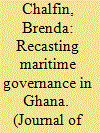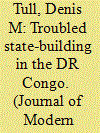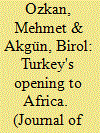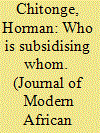|
|
|
Sort Order |
|
|
|
Items / Page
|
|
|
|
|
|
|
| Srl | Item |
| 1 |
ID:
101172


|
|
|
|
|
| Publication |
2010.
|
| Summary/Abstract |
This article tests the theory of advocates who celebrate the potential of civil society to promote and deepen democracy in Africa, by examining whether the human rights ministry of a Catholic parish in Kibera slum in Nairobi, Kenya was able to consolidate democracy through a civic education programme during 2002-5. It concludes, from an analysis of the social, economic and political environment in Kibera, that parishioners who participated in the programme demonstrated an observable improvement in their democratic values and behaviour at a localised level within their own parish groups. However, civic education did not stimulate most participants to increase their involvement in advocacy and lobbying efforts to hold government officials to account for their abuse of power in Kibera. Parishioners were inhibited from promoting their rights primarily due to fears of violent retaliation by local government officials and politically sponsored youth wingers. Other factors such as apathy, ethnic divisions, limited resources and restrictive church protocols further curtailed parishioners' actions.
|
|
|
|
|
|
|
|
|
|
|
|
|
|
|
|
| 2 |
ID:
101173


|
|
|
|
|
| Publication |
2010.
|
| Summary/Abstract |
In Africa, as elsewhere, ports are a telling indicator of the tenor of political power and the contests and shifting fortunes among ruling groups. Glaringly evident in the long era of imperial expansion, this is equally true in the present period of late-capitalist commercial acceleration and consolidation. With a focus on Ghana's port of Tema, a leading edge of containerised trade serving a vast swath of the West African sub-region, this essay examines the struggles between state agencies, indigenous capital, and the world's leading multinational shipping and logistics firms invested in port expansion. Rather than the predicted triumph of multinational concerns, the case of Tema reveals the persistent grip of Ghana's national port authority. Deftly capitalising on its claims over land, labour and legislation, this state body also mobilises preferential access to development assistance and financial aid. The result is a port defined by the aspirations and autonomous capacities of what may be described as a neo-developmental state. Both grounded in historical precedent and fragile in its configuration of multiplex and competing interests, Tema lays bare the complex forces at stake in the revitalisation of maritime frontiers now occurring across the African continent.
|
|
|
|
|
|
|
|
|
|
|
|
|
|
|
|
| 3 |
ID:
101176


|
|
|
|
|
| Publication |
2010.
|
| Summary/Abstract |
This paper examines contentious state-society and centre-periphery relations in the DR Congo and their implications for state-building. Since the 2006 post-conflict elections, the state's authority has come under fire in the western province of Bas Congo, where a politico-religious group (Bundu Dia Kongo) has emerged as a serious challenger. Enjoying huge local legitimacy, the group has articulated political grievances that the newly elected central government has violently repressed. As locally perceived, elections are a legitimising tool in the hands of the government to impose its unfettered authority in the name of the state-building project. Furthermore, and backed by donors, the Kinshasa authorities also refuse to implement a wide-ranging decentralisation reform. This has fed disenchantment about post-conflict politics in Bas Congo, boding ill for democratic politics and the prospects of state-building in the DR Congo.
|
|
|
|
|
|
|
|
|
|
|
|
|
|
|
|
| 4 |
ID:
101171


|
|
|
|
|
| Publication |
2010.
|
| Summary/Abstract |
As part of on-going multidimensional foreign policy changes in recent years, there has been since 1998 a revival in Turkey's relations with Africa. Initially rather passive, after 2005 this became a massive effort to develop relations with the whole continent. However, Turkey's Africa policy is unique in Turkish foreign policy, since for the first time it is driven and complemented by the activities of civil society organisations in and about Africa. Conceptualisation of Africa in Turkish society has changed dramatically in less than a decade, and the recent Turkey-Africa Cooperation Summit should be seen as part of this trend. Turkey's opening to Africa is not a short-term inclination, but is likely to develop and deepen in coming years.
|
|
|
|
|
|
|
|
|
|
|
|
|
|
|
|
| 5 |
ID:
101174


|
|
|
|
|
| Publication |
2010.
|
| Summary/Abstract |
This paper looks at the policy and practice of cross-subsidisation in the water sector, focusing on the Zambian experience. Setting a price for water services is a sensitive and controversial issue. Pricing water services below cost recovery can threaten the sustainability of the service and human welfare in the long term, while water pricing at full cost recovery often restricts access to water services for poor households, compromising their well-being. This paper looks at one of the approaches that policy makers use in an attempt to balance the trade-offs - cross-subsidisation. Lessons from the experience of implementing the cross-subsidy policy in Zambia are identified and discussed. This paper argues that while the objectives behind the cross-subsidisation policy are clear, the results from the implementation of this policy are, at best, unclear. The Zambian experience shows that for an indirect subsidy, such as cross-subsidisation (as opposed to a direct subsidy), to generate positive results, a careful consideration of the actual context in which the policy is to be implemented must be a precondition to its implementation.
|
|
|
|
|
|
|
|
|
|
|
|
|
|
|
|
| 6 |
ID:
101175


|
|
|
|
|
| Publication |
2010.
|
| Summary/Abstract |
The brutal, eleven-year long civil war in Sierra Leone has been understood by many scholarly observers as 'a crisis of youth'. The national elections of 2007 were notable for an explosion of popular music by young people directly addressing some of the central issues of the election: corruption of the ruling party and lack of opportunities for youth advancement. Though produced by youth and understood locally as youth music, the sounds were inescapable in public transport, markets, and parties. The musical style is a combination of local idioms and West African hip-hop. The lyrics present a young people's moral universe in stark contrast to that of their elders. This paper addresses the themes of these election-focused songs as well as the emerging subaltern youth identity discernible in supposedly less political songs.
|
|
|
|
|
|
|
|
|
|
|
|
|
|
|
|
|
|
|
|
|